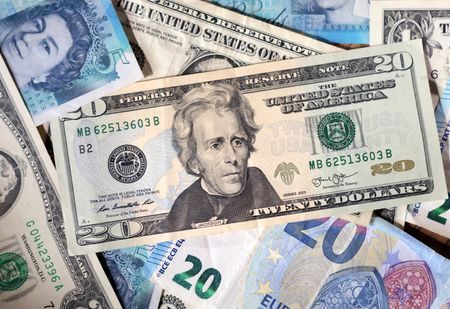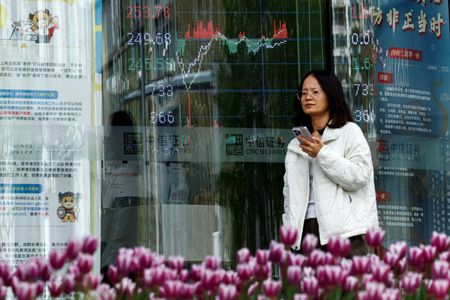By Rocky Swift
TOKYO (Reuters) -The dollar traded sideways on Tuesday after declining for a week, hemmed in by the Federal Reserve’s caution over the economy and as U.S. lawmakers came closer to passing a bill expected to widen the nation’s fiscal deficit.
The greenback sold off broadly on Monday following last week’s downgrade of the U.S. sovereign rating by Moody’s on deficit concerns. Now attention turns to a critical vote in Washington over U.S. President Donald Trump’s sweeping tax cuts.
The Australian dollar edged lower after the Reserve Bank of Australia’s cut benchmark interest rates by 25 basis points, as widely expected, and warned about uncertainty stemming from global trade tensions.
Atlanta Federal Reserve President Raphael Bostic told CNBC on Monday the U.S. central bank may only be able to cut interest rates by a quarter point over the rest of the year given concerns about rising inflation stoked by higher tariffs.
Trump is expected to join the congressional debate over his tax bill on Tuesday. The vote comes after Moody’s stripped the U.S. government of its top-tier credit rating, citing concerns over the nation’s growing $36.2 trillion debt pile.
“The market is still very wary of the lack of austerity coming from the fiscal side in the U.S.” said Rodrigo Catril, senior FX strategist at National Australia Bank.
“We think that is potentially a driver for dollar weakness over the coming quarters as the market is likely to demand a higher premium to lend money to the U.S.,” he added.
Trump’s bill would add $3 trillion to $5 trillion to the debt, according to nonpartisan analysts. Ballooning fiscal debt, trade frictions, and weakened confidence about enduring U.S. exceptionalism have weighed on U.S. assets. The U.S. dollar index has tumbled as much as 10.6% from its January highs, one of the sharpest retreats for a three-month period.
The dollar got a breather after Trump paused many of the largest tariffs he announced last month. But comments from Japan’s top trade envoy on Tuesday that Tokyo was firm in its anti-tariff stance pointed to no easy off-ramp in the negotiations in the weeks and months ahead.
And in the wake of Trump’s tariff turmoil, Britain on Monday agreed to the most significant reset of defence and trade ties with the European Union since Brexit.
The greenback was little changed at 144.75 yen, after touching 144.66 on Monday that was the weakest since May 8. The dollar index slid 0.1% after losing 0.6% in the previous session.
“The FX market is choppy with few cues,” said SMBC chief currency strategist Hirofumi Suzuki. “The G7 finance ministers and central bank governors’ meetings and the Japan-U.S. trade negotiations are anticipated, making it difficult for the market to move.”
Japanese Finance Minister Katsunobu Kato said on Tuesday he hoped to exchange views on currency policy and various bilateral themes with U.S. Treasury Secretary Scott Bessent when G7 finance chiefs meet in Canada this week.
The Australian dollar fell 0.5% to $0.6423, trimming a 0.8% gain on Monday. The RBA cut its main cash rate to a two-year low of 3.85% citing a darker global outlook and cooling inflation at home.
Sterling was little changed at $1.3353. The euro was flat at $1.1249.
(Reporting by Rocky Swift; Editing by Stephen Coates)










